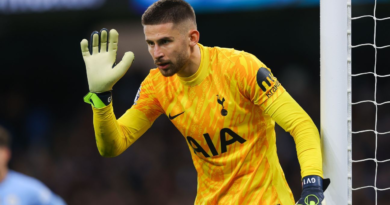Referee drama overshadows the real takeaways from Real Madrid vs. Valencia
The splenetic outpouring of nonsense after Real Madrid‘s 2-2 draw at Valencia on Saturday — because Los Blancos were denied an ultra-dramatic added-time winner by the referee who’d blown for full-time — has been as half-witted, misplaced and laughable as the match was thunderous, fun and memorable. What that furious brigade, mostly those who orbit around this mighty club, don’t seem to care about is that not only have they been wholly wrong in their rage-filled outcry, but they’re really only succeeding in muddying the waters around what actually happened.
Just in case you weren’t watching, Valencia’s 2-0 lead was hauled back once Madrid woke up and, at the end of the match, referee Jesus Gil Manzano earned a wealth of vitriol for having followed FIFA rules to the letter.
After Vinícius Júnior had levelled the contest with two goals — one of which he celebrated in the same manner as Tommie Smith and John Carlos at the 1968 Olympics — Gil Manzano allowed all the added time, plus some more, to play out and then blew his whistle. He did so before Brahim Díaz crossed the ball in for Jude Bellingham to nod in what would have been the winning goal … had the match not been over. There was a melee on the pitch, Bellingham was shown a red card for his pungent remarks to the referee, there was a skirmish in the tunnel and then a torrent of nonsense around Los Blancos in the Spanish sporting media and on social media.
– Stream on ESPN+: LaLiga, Bundesliga, more (U.S.)
The laws of the game say absolutely zero about the referee either being required, or advised, to let a move finish, either with a goal or a clearance, before blowing his whistle to signal the end of a half or the end of the match. Some people think it should be that way, by “common practice” rather than law, but speaking personally, I didn’t see anything but relief on the faces of the Madrid players and staff when the same Gil Manzano blew for half-time in the midst of a very promising Valencia attack while ahead 2-1. Therefore I call hypocrisy on Madrid’s reactions when the shoe was on the other foot some 50 minutes later.
Having co-commentated on the match, I can say that the first “toot” of Gil Manzano’s final whistle was very clear before Brahim even struck the cross that Bellingham converted and was distraught to see ruled off. More, the ref had played the defined amount of added time and some more: he was not only within his rights, but he was right.
After the match, Madrid manager Carlo Ancelotti suggested that something “beyond human knowledge” had occurred. Now, let the record show I think Madrid’s Italian coach is from the all-time great set, truly: he belongs on football’s Mount Rushmore. But this tirade was not only ill-judged; he was wrong.
I remember an identical incident in the 1978 World Cup match between Brazil and Sweden. (At the time, Ancelotti was already an established Parma player and just about to be signed by Roma). Worse, Carletto, don’t you recall the identical thing happening to Karim Benzema when you were his Madrid manager in 2014?
It was the World Cup in Brazil, June 20 to be precise: France were leading Switzerland 5-2 when Benzema thrashed home a cross from the right wing, only for referee Bjorn Kuipers to disallow the goal because he has blown the final whistle while the cross is in the air. Others have already commented on more recent “goals” in the dying seconds, having been struck off by referees in Spanish football who’ve judged that time is up.
All in all, the vitriol that ensued was just farcical. Across a variety of outlets, there were repeated uses of hyperbole, such as “historic scandal,” “biggest scandal in recent years,” “shameful” and “an adulterated league” — all of it about a decision that was 100% correct as per the laws of the sport.
Apart from the damage to the credibility of those who soothed themselves by crying foul, there was damage done to where the focus might have otherwise been. Choose what you want to begin with, but I choose the positive.
Vinicius found the alertness, wit and strength of character to score twice in a match that was nearly lost and in which he was, otherwise, producing a pretty anodyne performance. That’s an important characteristic to possess. Kudos to him.
Everyone will have their own views, but in the constant and agonisingly slow battle to find the right means of combating and educating against racism, the Brazilian player mimicking Smith’s raised-fist salute, directing it toward fans who have abused him on more than one occasion, sits well with me. It was elegant, dignified, rooted in history, and it sent a clear message that wouldn’t earn him a booking or expulsion. I welcome what he did.
More positives?
Brahim had to swallow the fact that despite his lovely form in recent weeks, the return of the majestic Bellingham meant the dynamic midfielder was sent to the bench again. Yet he was superb after coming into a mad fray after an hour with his team trailing 2-1. Although the “assist” for Bellingham’s disallowed header in the 99th minute won’t stand, his general play — and the simply magical ball he clipped up to Vinicius for his second goal — speak of a lad in the prime of his life and in blistering form. Spain need to start picking and playing him immediately, or else Morocco, for whom he’s eligible, could lure a generational talent to represent them instead.
Now, the negatives that were obscured.
In that first half while Valencia played for their lives, Madrid were sleepy and sloppy. My opinion is that some of the fury unleashed when Gil Manzano denied what would have been their late winner wasn’t just competitive rage, but an aftertaste of the embarrassment they thought they’d got rid of following those horrible first 45 minutes.
Valverde and Kroos made very uncommon mistakes, while Vinicius and Carvajal, respectively, were directly culpable for Valencia’s two goals. Los Che, a team made up of youngsters and run-of-the-mill footballers, were significantly superior.
Was it disastrous? No. Madrid are still red-hot favourites to win this league, but the barely recognisable lethargy and preventable errors can be contextualized by several passage of play in their two draws, against Rayo and Atletico, over the past four league matches. A blip, but a troubling one.
Normally all these things — Vinicius, Brahim, Madrid’s erratic form — would be under the spotlight, but most discussion involved ranting and raging about something that was not a real issue.
Human nature being what it is, however, it’s something that Madrid, as an institution, should evaluate. Might their onslaught on referees in due course bring either a conscious or subconscious backlash? You be the judge.
Now comes a second date with RB Leipzig. Madrid are 1-0 up on aggregate in their Champions League round-of-16 affair and should cope. They are the better side and should be trusted to progress. But part of what has been extremely attractive and praiseworthy — to me, at least — is how Madrid, when in extremis, have produced a flurry of very late, last-minute or added-time goals (Union Berlin twice, Napoli, Barcelona, Getafe, Almeria, Atletico, Celta are some) that have helped rescue or win games this season.
Was any of their angst and fury at Valencia to do with the inner knowledge that perpetually living on the edge, as they’ve done so often, is fun and thrilling, so long as you never fall off?




